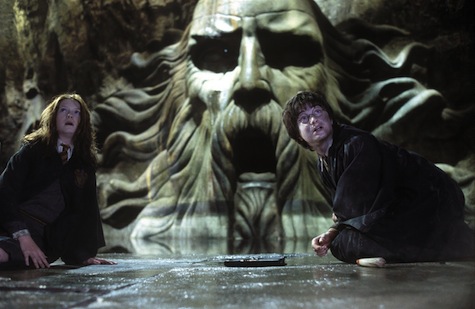Rewatch in the reread time, everyone! Look out!
Now… what of Chris Columbus’ second (and final) foray into the Potter universe? Well, for one, I had forgotten how long it was. A film for the little ones that easily goes for two-and-a-half hours? What world is this? The answer, of course, is a world obsessed with Harry Potter. This film came out after Goblet of Fire was published, and Hogwarts Mania was firmly in the zeitgeist.
The movie is a mixed bag for sure, but it’s better than I remembered. I think it helps having some distance on these babies—now that the hype is no longer present, there’s less riding on these films being the best that they can possibly be.
So much of the book is packed into this film, you think at times it might explode. On the other hand, it flows alarmingly well. I think this is mostly a testament to how tight the story is all by itself. It might be a bore to some people, but for fans, it’s nice that they linger on sets and aspects we haven’t encountered yet. They knew that people didn’t want to miss out for the sake of a shorter film.
Biggest mistake in the film is not including Lucius and Arthur’s epic dad fight. Trade the dumb action-y bit with the Ford Anglia and give me the dad fight. DAD FIGHT.
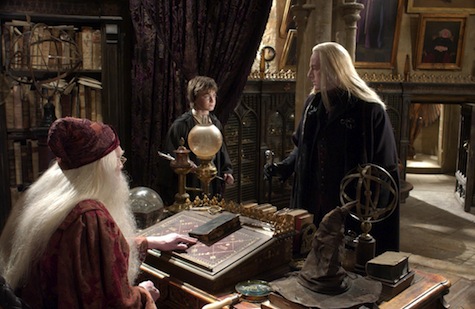
That’s a lie, though, of course. The film makes more than a few missteps, one of the primary ones being the continued choice to relegate Ron to comic relief and Hermione to SuperWonderGirl. I understand that Kloves likely felt as though his scripts were playing to the kids’ strengths as young actors, but no one is doing Rupert Grint a favor by never giving him meatier material. In addition, a lot of the line swaps don’t make sense; for example, Hermione’s hurt over being called a Mudblood. In the book, she is rightly baffled—how can a curse word you’ve never heard hurt your feelings? Ron is offended on her behalf and explains it all to Harry because he knows what the word means. He knows why it’s wrong. Instead we’ve got tears glistening in Emma Watson’s eyes and Hagrid’s heartfelt reassurances.
It’s aggravating because it’s actually damaging to Hermione’s character as well. The scripting choices recast her as the group’s heart (in addition to being its brain), which is a typical role played by practically every female character in a group of boys. That wasn’t how it worked in Potter. Harry was the nerve, Hermione was the brain, Ron was the heart. The dynamic was interesting because it was fresh. It is nice that Hermione gets a little added screen time, seeing as she’s is benched for a good portion of the tale, but there were smarter ways it could have been done.
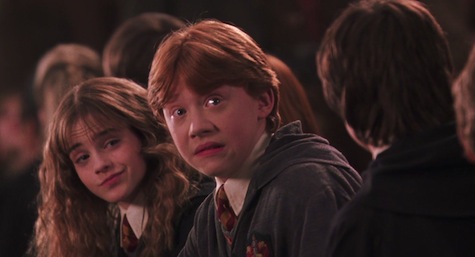
Equally important is this movie’s choice to sideline a character who is perpetually disrespected in all the Potter films—Ginny Weasley. It’s less important here, I’d argue, but the result makes for a weaker mystery this time around. Because the film spends next-to-zero time giving Ginny any focus (there are one or two shots of her looking grumpy for all our trouble), the reveal that she opened the Chamber of Secrets falls flat. It’s a surprise because it genuinely is surprising, which is wrong. Most of the fun in Potter mysteries was that moment of ‘aha’ when all the little clues came together, when you felt a little dumb for not piecing the puzzle out fast enough. There are practically no clues in this film, no indication through the narrative. I don’t think it’s the only Potter film to have this problem, either, but we’ll hit on that later.
On the technique front, it turns out that Columbus switched to handheld cameras for the second film, wanting the freedom to move. As a result, sometimes he moves too much. The scene where Riddle is talking to Harry in the Chamber is marred by the camera swerving around him as he speaks practically the entire time. Stay still, camera. Camera, stop. Camera, no. (Also, he lights Lucius Malfoy so strangely at the end of the film. The old “highlight just the eyes” trick. Just a strip of light across his face. So goofy.)
Ron, your voice is dropping! Everyone’s voice is dropping! This is one of the toughest things about filming with child actors over a long period of time. There are hilarious and unavoidable technical flubs in this film, points where it’s clear that they had Radcliffe go back and dub over a line after shooting and his voice is considerably lower. In some ways, it adds to the magic, that lack of polish. The special effects are alarmingly out of date in places, and it hasn’t really been that long—shots where the car or those flapping Quidditch robes really stand out. And the places where they chose to nix the CGI are a welcome departure, such as the live puppet version of Fawkes. He’s just so gentle and wise-looking. I wanna cuddle him.
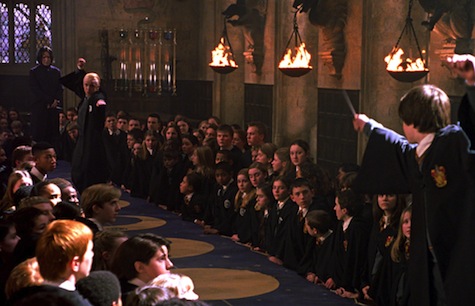
Weird aside: the lack of new music in this soundtrack is frankly jarring. There are a couple new themes (Fawkes’ music is gorgeous and the Chamber’s music is wonderfully ominous), but aside from that, too much of it is ripped exactly from the first movie. It seems pretty obvious what happened; John Williams was working on this film and Star Wars: Episode II at the same time, and I think completing two completely new scores was too tall of an order. Attack of the Clones suffers similarly; a lot of its random incidental music is pulled verbatim from Phantom Menace. He’s back on form for the next soundtrack, so at least he wasn’t simply bored with the material.
It sounds like I’m overall unhappy with this movie, doesn’t it? I’m not really, not at all. It makes for a thoroughly enjoyable viewing experience. The kids are already exponentially better at inhabiting their roles, and it makes this movie so much more fun than the first. There are still cardboard moments strewn throughout, but Radcliffe’s sass level is at 10 through the entire film. His comic deliveries (“I think we found the train.” “Thank you. We’ll just… go.”) are not only a highlight, but endear you to Harry as a character in a way that the books sometimes fail to do. After all, in the books Harry is more of an audience avatar. On film, he has to be his own person. Then there’s Rupert Grint—though he is only permitted slapstick reaction shots, he handles them like a pro. Emma Watson is already showing a depth that will soon morph into some real chops. (I don’t understand why they crimped her hair, though. It’s just weird.) Tom Felton is hilarious as Draco on Round 2, though someone seems to have given him instructions to over-pronounce every line.
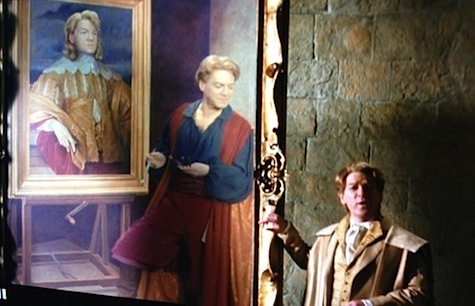
Hugh Grant was in running at the start, but the casting of Kenneth Branagh as Gilderoy Lockhart is a stroke of genius that can only be compared to the genius that is his wardrobe. His high-waisted dueling slacks rule my world. There’s really not much more that needs saying, unless we want to talk about his painting of himself painting himself, which I will talk about forever because it was one of the most perfect set dressing decisions ever made in the history of film.
Jason Isaacs is a similarly perfect piece of casting and famously adored his role. I do have to agree that his final shot at Harry in the film is an undermining of his character, though. The fact that they suggest that Lucius Malfoy would be willing to murder Harry Potter (he raises his wand and utters the beginning of the Killing Curse) in broad daylight at Hogwarts is at odds with everything we know about the guy. Just an odd, wrong choice. And then we have Richard Harris’ final turn as Dumbledore. He offers some incredible silent takes in reaction to others, but knowing that Harris died shortly after this, it’s hard not to feel as though he is losing steam throughout the film. It’s sad to remember that we only got two of these movies with him, even if he wasn’t keen on doing them in the first place. (He only agreed because his granddaughter insisted he take the role.)
But the real clunker that stands out here is obviously the film’s ending. Hagrid is delivered back from prison, gives a big thank you to the trio for proving his innocence, Harry has to utter a stilted “there’s no Hogwarts without you, Hagrid,” and the majority of the school rises to applaud. It is one of the most awkward bookends on a film… ever? Probably ever. You can tell that Radcliffe has no idea how to deliver the line, that no one really knows what they’re celebrating. And what’s more, we have not been emotionally set up in the film to worry much about Hagrid, so the sudden sharp focus on him is plain strange. The film treats his imprisonment similarly to the book—he’s sent away, then he’s back. Hooray! The only thing I can figure is that Kloves made the mistake of operating on the other books in the series; in book three, we find out that being sent to Azkaban is nothing like spending a few weeks in a federal penitentiary. It’s basically torture.
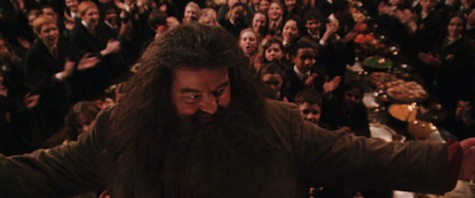
Knowing that, perhaps he wanted to make more of a deal out of Hagrid’s return, give him the hero’s welcome he deserved for going through something so terrible. But the film does not make any move toward indicating just how bad Azkaban is, so the scene still doesn’t play. It’s just overly sappy and un-earned.
So… that’s sort of a problem. But otherwise, it’s a perfectly fun movie!
Next up is arguably the most artistic of the Potter films. It’s also one of the most problematic, in my opinion. But we’ve got a whole book to get through before we hit that….
Emmet Asher-Perrin does love that Fawkes theme, though. You can bug her on Twitter and read more of her work here and elsewhere.










